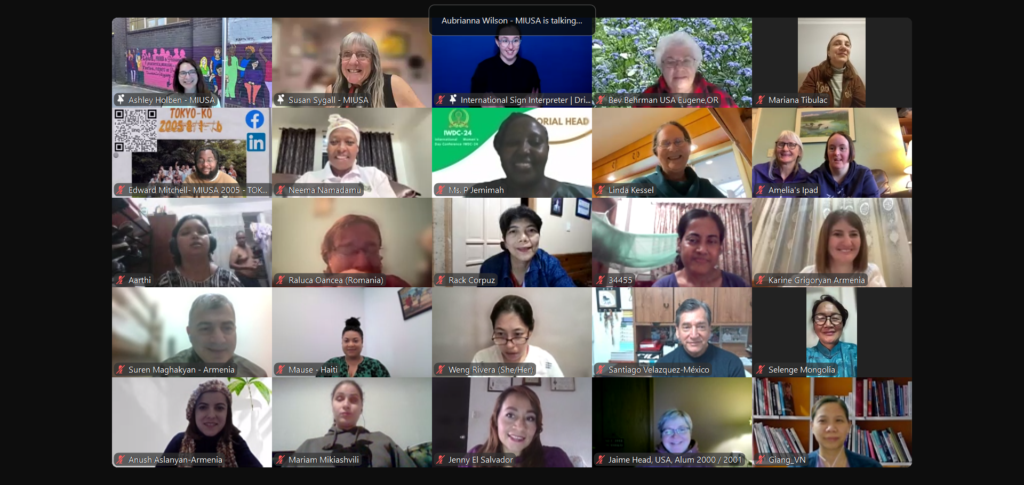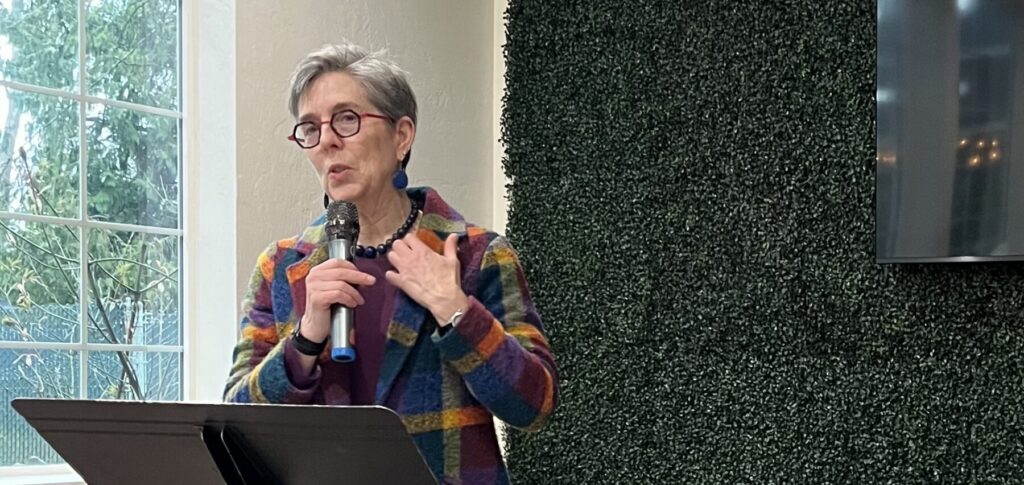What International Exchange Can Teach Us About Identity: 14 Disabled Travelers Reflect on Their Experiences Abroad
Date:
In new cultural contexts, you may find that how local people perceive you is different from how you’re perceived at home and even from how you perceive yourself. Certain aspects of your identity may be more “visible” or stand out more than others. This could be positive, negative, or neutral. Flattering or frustrating. You might find that the aspects of your identity that are most salient to you – perhaps race, cultural heritage, or disability – seem to be overshadowed by your nationality or perceived wealth:
Don
“[In the developing world] they see that you are an affluent person, because you dress well and so on. They treat you better than they do their own people with disabilities. It’s more of an economic thing than a disability thing.” For example, Galloway noted that in Zimbabwe, men with all types of disabilities have little chance of getting married, because of the assumption that they cannot work and support a family. On the other hand, Galloway found that as an African-American man, many women were drawn to him regardless of his blindness. “The attitude was, ‘You got here, so you must have some income.'” – Don Galloway, who conducted research and technical assistance in several countries. Continue reading: Global Legacy of a Black Disabled Activist
In contrast to travelers who experience newfound privilege in their host communities, others unfortunately confront microaggressions or even blatant discrimination:
Michelle
“As a black woman, I couldn’t find comfort in the Korean society as a whole. Until then, I didn’t really realize to the full extent what it meant to be black abroad. Or what it meant to be black and Deaf in another country. Up until this point here in the United States, I felt like there were no barriers, nothing that I couldn’t do….But in Seoul, taxis would just pass me without stopping. People kept coming and touching my hair. And that was very, very hard to navigate.” – Michelle Morris, who interned with a Deaf organization in South Korea. Continue reading: I Found My Tribe in Seoul.
Kenny
“In Japan my experience was basically that people treated me strangely because I was a foreigner, because I was basically Caucasian. And not because I was disabled. And in Germany it’s different. I’m a new wheelchair user, and Berlin was pretty much the first city where I used the wheelchair more than I have other places, so I noticed more invisibility, more staring in Germany than I did in Japan, which is surprising.” – Kenny Fries, Fulbright researcher whose work often centers around his intersecting identities as being gay, Jewish and disabled. Continue reading: Studying Abroad Has Been Indispensable
Traveling with others can impact identity dynamics too, either in and of themselves or in the presence of local people. In this tale of two cities, disabled people of color traveling with white non-disabled peers describe opposite and amusing interactions with local people:
Juanita
“Because of my Latin American roots and appearance (I was adopted from Colombia), many Costa Ricans assumed that I was a local. If I was with a group of American friends, the Costa Rican people we met would often address me – in Spanish – instead of others in the group, assuming I was the interpreter. I didn’t really mind. Considering the times in the U.S. when people would address my friends instead of me due to my disability, it was an interesting role reversal, not to mention a great way to get some extra language practice!” – Juanita Lillie, study abroad alum who is blind. Continue reading: Encouraging Others to See the World
Hannah
“One time in Beijing I tried to order tea. I couldn’t say it right so the waitress looked to [my roommate and sighted guide] Ruby to translate. This was pretty funny because Ruby has white skin and blonde hair…most of the time in China, Chinese people look to the Asian-looking kids to translate, regardless of language ability, but this was kind of the other way around which was funny.” – Hannah Chadwick, study abroad alum who is Chinese-American and blind. Continue reading: Scaling the Greatest Walls
Travelers with disabilities may observe that differences in the availability of assistive devices, services, and technology can underscore socioeconomic differences…
Teresa
“All of the students at the school were captivated to meet me. They’d all swarm me or ask to take pictures. Part of this was because I have different hair and skin than they are used to seeing – they thought I was born in Brazil! But they were also stunned to see my hearing aid and wanted to touch it. The students didn’t have any hearing aids because they’re so expensive there.” – Teresa Pichardo, a Deaf Dominican American who volunteered at a school for deaf children in Ghana. Continue reading: Opening Worlds Through Teaching
Then again, one’s disability identity might be an “equalizing force”:
Megan
“As volunteers with disabilities we are in a unique position of creating an equal, interdependent relationship with our host communities, where no one feels like ‘charity.’ Asking for assistance from the communities you are assisting often is an equalizing force. As you, the volunteer, contribute something to the community, the community is able to give something back.” – Megan Smith, who has volunteered in Costa Rica, Nepal, and more. Continue reading: The Dual Impact of Volunteering Abroad
Allowing yourself to explore issues of identity, diversity and intersectionality during your global experiences might influence your work going forward, whether in the U.S. or internationally:
Joseph
“After my experience in Italy, I spent a lot of time thinking about my own identities and perceptions, and then thinking about how I can give back to America. I’m feeling more understanding about how people see things and understanding that I can’t make assumptions, because I don’t know the point of view from which they come. So I include that in my teaching with my students, many of whom are not deaf. They are hearing. They are often working with people who are different from them. And so I am encouraging them to see perspectives that are different than their own.” – Joseph Hill, U.S. Fulbright researcher and professor who is Deaf and black. Continue reading: A Deafness Studies Fulbright Experience in Italy
Anjali
“In the Paralympic village I realized that there were athletes from other countries who don’t necessarily always have the same access to the amazing coaching staff and equipment that we are fortunate to have in the United States. I became very aware of that from the time that I started competing on the world stage… I’m also adopted from India and so I think that it definitely kind of struck a chord at a personal level as well, which is why this has become a part of my mission [to bring athletic opportunities to disabled people through international development work.]” – Anjali Forber-Pratt, Paralympic athlete in wheelchair racing. Continue reading: Paralympic Epiphanies and International Development
Allen
“I always tell Deaf Americans that many of our brothers and sisters who live overseas are hungry to learn. Serving gives you the opportunity to travel, to see the world, and to share and empower new communities. Maybe you can learn from them and share it back in America. Life is short; grab the opportunity!” – Allen Neece, Returned Peace Corps Volunteer who is Deaf. Continue reading: Reflecting on 55 Years of Peace Corps
Traveling internationally can be tough. Be kind to yourself, and be open to how your unique mix of identity, character, and experiences can be a potential source of strength:
Justice
“Yes, I am someone who is blind, but I’m also someone who is black, a woman, a lesbian. All of these aspects are as much a part of my identity, and I am proud of them, but none of them individually solely represent me. If you can find ways to be who you are, even when it’s difficult or not accessible, people will remember you as a whole person.” – Justice Shorter, who studied abroad in Rwanda and Uganda. Continue reading: Experiential Learning at the Nexus of Theory and Practice
Carlton
“Maybe I had been rehearsing my whole life in order to be prepared for the kind of work I do now. Maybe all the songs and stories I stored inside helped me get through the dark times.” – Carlton Rounds, founder of Volunteer Positive who is HIV+ and is involved with the LGBTQ performing arts community. Continue reading: Able to Serve
Michelle
“One really important thing I learned about being a black Deaf person in Korea is that I’m not alone. My experiences may be different, but they will not prevent me from what I need to do.” – Michelle Morris, who interned with a Deaf organization in South Korea. Continue reading: I Found My Tribe in Seoul.
Callie
“‘How is a black person’s life in America?’ They asked me a lot of questions about that. I said my life is different than it is for white Americans, but I’m successful, I’m motivated, and I’m enthusiastic in how I’ve gone through my life.” – Callie Frye, a Deaf woman who interned abroad in Cameroon. Continue Reading: Sit Beside Me, Go Forward Together
Are you a person with a disability who has an international exchange experience? Do any of the above stories or quotes resonate with you? Tell us what your international exchange experience taught YOU about identity, diversity, and more. Your responses might appear in a future NCDE publication and/or on the MIUSA website.
Sign up for our E-News






Manage Your Privacy